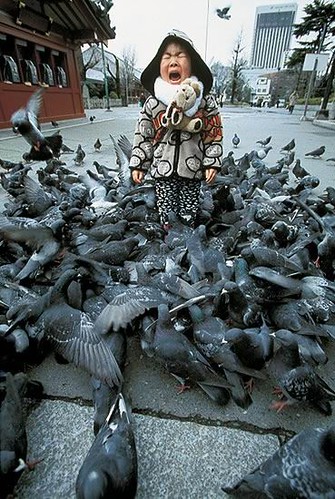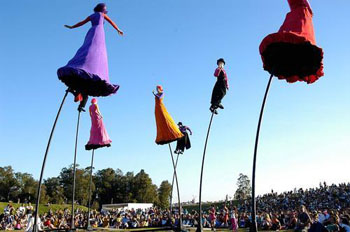BLOG
Terça-feira,
19/7/2005
Blog
Redação
 |
|
 |
|
| |
Alfa Romeo e os bloggers
Parece ser que Alfa Romeo no entiende el internet, no se dan cuenta que los usuarios que entran a los foros de su sitio no son los consumidores de antes, esos que veían publicidad tipo "el mejor carro del mundo" y se la creían. En internet los consumidores buscan toda la información disponible y si algo huele mal no solo investigan al respecto sino que lo publican.
Como Alfa Romeo no entendió el internet ahora Fernando, uno de sus clientes que casualmente tiene un blog está escribiendo sobre la pésima experiencia que ha recibido de la marca, de su sitio web, de los foros de discusión y de los administradores de este que borran sistemáticamente cualquier post que ellos escriban intentando recibir ayuda sobre un problema en el carro que parece ser de diseño (y no de uso).
Los directivos de Alfa Romeo parece que no saben que es el internet y el problema con este tipo de personas es que intentan controlarlo. Cada vez que me topo con empresarios así o en una situación de esta, inmediatamente hago referencia al World of Ends de Doc Searls y David Weinberger:
Las tres virtudes de internet:
1. Nadie es el dueño
2. Todos pueden usarlo
3. Todos pueden mejorarlo
La gente de Alfa Romeo cree tener el control sobre internet, que puede manipularlo y manejarlo a su manera, básicamente cree que pueden ser los dueños del medio, eso nunca sucederá, por lo mismo Fernando sólo necesitó hacer una búsqueda en Google y encontrar un foro alterno llamado Alfistas, donde hay total libertad de temas.
Eduardo Arcos, em seu ALT1040 (porque, para mim, é um dos melhores blogs da atualidade).
[Comente este Post]
Postado por
Julio Daio Borges
19/7/2005 às 13h07
|
| |
Blogging+Video=Vlogging
It was inevitable: Bloggers who previously wrote endlessly about everything from politics to tech tips to how to fry an egg on a hot sidewalk can now take their commentary, advice and random experiments to the next level by filming and broadcasting their work, thanks to the latest web trend - video blogging.
Video blogs - also known by their shorter, clunkier name, vlogs - are blogs that primarily feature video shorts instead of text.
Like another web trend, podcasts, where people can subscribe to largely home-brewed audio programs, people can sign up to receive regular video downloads. Though it has not been promoted, the new Apple iTunes podcasting feature supports vlog subscriptions as well.
"We're going from being media consumers to media makers. We're learning how to do that," said Chuck Olsen, a documentary filmmaker and video blogger in Minnesota. "There's sort of a whole continuum between (videotaping) grandpa's birthday and filmmaking."
Katie Dean, na Wired (porque é muito melhor do que assistir televisão - assistam).
[Comente este Post]
Postado por
Julio Daio Borges
19/7/2005 às 12h24
|
| |
Love of the land
When they first met in Paris in 1896, in an encounter that would become a foundation myth of the Irish Literary Revival, WB Yeats was 31 and JM Synge was 25. Later, Yeats would chronicle what happened, suggesting that it was his advice in that meeting that led to the making of Synge as a playwright and an artist. Yeats wrote: "He told me that he had been living in France and Germany, reading French and German literature, and that he wished to become a writer. He had, however, nothing to show but one or two poems and impressionistic essays ... Life had cast no light upon his writings. He had learned Irish years ago, but had begun to forget it ... I said 'Give up Paris. You will never create anything by reading Racine, and Arthur Symons will always be a better critic of French literature. Go to the Aran Islands. Live there as if you were one of the people themselves; express a life that has never found expression.'"
Colm Tóibín, sempre imperdível, no Guardian.
[Comente este Post]
Postado por
Julio Daio Borges
18/7/2005 às 19h43
|
| |
Pigeon attack

Do moreno pissed off, um blog de fotos que eu vou até assinar, e que linca pra nós.
[Comente este Post]
Postado por
Julio Daio Borges
18/7/2005 às 15h49
|
| |
Technorati vs. Google
At its essence, Technorati may be a search engine, but its approach is vastly different. Google, for instance, views the web as the world's largest reference library, where information is static. Instead of the Dewey Decimal System, Google employs its PageRank technology, which orders search results based on relevance. Google uses words like web page, catalogs and directory, which are more than just words: They convey an entire worldview.
In contrast, Technorati sees the internet as a stream of conversations. This makes it much more immediate. Google requires two to three weeks to input a site into its search engine. (Although it does post frequently updated content from news sites.)
For Technorati, it takes about seven minutes to index a post. Those who use complementary tools like LiveJournal, AOL Journals and Blogger can expect their posts to pop up on Technorati almost instantaneously.
"With Technorati, you know what is being said, when it is said, and who is saying it," [David] Sifry [founder of Technorati] said. You can track the metamorphosis of an idea, not only who commented on it last but who came up with it first.
Adam L. Penenberg, explicando a diferença entre Technorati e Google, sempre na Wired.
[Comente este Post]
Postado por
Julio Daio Borges
18/7/2005 às 12h41
|
| |
Movimento Literatura Urgente
O Santiago Nazarian falou e falou bonito sobre a miséria que nós, escritores da borda, vivemos. Pelo terceiro mês seguido, minhas contas não fecham e eu vou ter que pedir dinheiro emprestado. Só que como eu não tenho família nem amigos ricos, peço dinheiro ao Banco do Brasil. Você sabe o que é pagar juros bancários pra cobrir despesas normais de uma vida sub-normal? E o pior é que tem muito amigo meu que ainda me acha sortuda: Você ainda tem crédito no Banco do Brasil?
Você sabe onde eu estarei hoje lá pelas 6 da tarde? Sacudindo o esqueleto dentro de uma Kombi caindo aos pedaços, catando mendigo pelas ruas do Capão Redondo. Isto porque o senhor secretário não quer nenhum mendigo na rua. Mas vocês acham que eles querem ir para o abrigo da prefeitura? De jeito nenhum. Mil vezes ficar na rua a ser levado feito pacote extraviado para um lugar cheio de gente que ele não conhece, um lugar que parece um hospital, um lugar onde vão obrigá-lo a tomar banho e a deixar o cachorro, que ele tanto ama, do lado de fora.
As assistentes sociais acham isso um barato. É o tesão da vida delas, elas estudaram pra isso, escolheram fazer isso na vida. Mas, positivamente, este não é o meu caso. Eu sou apenas uma escritora pobre que prestou um concurso para socióloga e caiu, por acaso, nesta secretaria. Uma escritora que há 14 anos é obrigada a fazer coisas que não suporta até que a aposentadoria (ou a morte) me liberte. Oremos por todos nós.
Ivana Arruda Leite, indiretamente, sobre a matéria da Veja (sobre o Movimento Literatura Urgente), que o Marcelino Freire comentou, e o Ademir Assunção e o Ricardo Aleixo...
[Comente este Post]
Postado por
Julio Daio Borges
15/7/2005 às 14h47
|
| |
Etcétera e tals

Uma foto da Camila, cujo blog linca pra nós.
[Comente este Post]
Postado por
Julio Daio Borges
15/7/2005 às 09h12
|
| |
Web Content for the Masses
From photo- and calendar-sharing services to "citizen journalist" sites and annotated satellite images, the Internet is morphing yet again. A remarkable array of software systems makes it simple to share anything instantly, and sometimes enhance it along the way.
Inexpensive to create and worldwide in reach, the new Internet services are having an impact far beyond the file sharing at issue in the Supreme Court's decision (...), which focused on copyright violations using peer-to-peer software.
Indeed, the abundance of user-generated content - which includes online games, desktop video and citizen journalism sites - is reshaping the debate over file sharing. Many Internet industry executives think it poses a new kind of threat to Hollywood, the recording industry and other purveyors of proprietary content: not piracy of their work, but a compelling alternative.
The new services offer a bottom-up creative process that is shifting the flow of information away from a one-way broadcast or publishing model, giving rise to a wave of new business ventures and touching off a scramble by media and technology companies to respond.
"Sharing will be everywhere," said Jeff Weiner, a Yahoo senior vice president in charge of the company's search services. "It's the next chapter of the World Wide Web."
John Markoff, no The New York Times (mais uma reverência, à "pequena", da mídia grande...).
[Comente este Post]
Postado por
Julio Daio Borges
14/7/2005 às 17h00
|
| |
Noite de Autógrafos
Fui pontual, como de costume. Tudo bastante organizado e muito parecido com o que eu tinha imaginado. Entretanto, naquele momento em que poucos haviam chegado, pensei que a noite seria longa e, de certo modo, um tanto "desconfortável" para quem, como eu, não é muito adepto de grandes aglomerações. Procurei o banner com o meu nome e sentei à mesa a mim destinada, que seria dividida com outro autor. A idéia original devia ser mesmo economia de espaço, mas não deixava de ser interessante a possibilidade de fazer com que os autores - quase que ainda totalmente estranhos uns aos outros - se conhecessem um pouco mais. Na minha mesa não deu certo, e eu nem tive chance de puxar conversa com meu parceiro, que preferiu ficar de pé, junto dos amigos e da família - o que não me pareceu nada censurável. Por outro lado, conversei um pouco com o autor da mesa vizinha: lembrava bem do conto nada ortodoxo dele, e o achei bastante simpático. (...) Não demorou muito para que alguns dos meus amigos me encontrassem no ambiente já bastante cheio e movimentado, e desfizessem por completo a imagem que eu havia esboçado mentalmente na chegada. Outros amigos não demoraram a se juntar a nós. Foi uma noite bastante divertida e agradável...
Wagner Campelo, um quase escritor, sobre sua noite de autógrafos (porque o seu blog linca pra nós...).
[Comente este Post]
Postado por
Julio Daio Borges
14/7/2005 às 09h00
|
| |
A season of everlasting spring
Here we go again, back to the NME's glory days. Back to a mythology of office fist fights (true), typewriters thrown from tower blocks (untrue), drug ODs (a couple), hip young gunslingers (more than a few) and counter-cultural cool (we tried).
In the past few years, we've had Nick Hornby confessing that NME hack was the dream job he never had, Jonathan Coe featuring the paper in The Rotters' Club, obligatory mentions in every profile of those reluctant NME twins Tony (Parsons) and Julie (Burchill). Now comes an hour-long BBC documentary ostensibly covering the paper's entire 50-year history but focused on the Seventies and early Eighties, years which contain NME's so-called Golden Age when, to quote Ovid, 'men of their own accord, without laws, did what was right... a season of everlasting spring'.
Naturally, my personal nomination for NME's Golden Age was the era of my editorship (1978-85), less for its circulation increase (which peaked in 1980) than for the way it treated music as part of a wider oppositional culture in which politics, books, movies, illustration and photography all had a major role.
Neil Spencer, ex-editor da NME, sobre os 50 anos da publicação (enquanto isso, no Digestivo Cultural, Ana Maria Baiana fala da Rolling Stone brazuca...).
[Comente este Post]
Postado por
Julio Daio Borges
13/7/2005 às 16h43
|
Mais Posts >>>
Julio Daio Borges
Editor
|
|